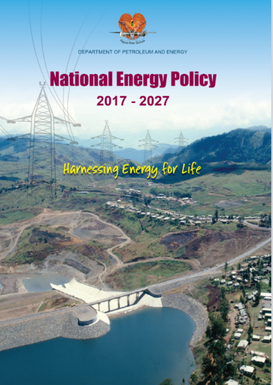Papua New Guinea National Energy Policy 2017 - 2027 : harnessing energy for life
- Description:
- Energy is the engine of economic growth. Therefore the Government recognizes the need to manage the energy sector in a manner that is efficient and sustainable. Development of the country’s energy resources therefore will be coordinated in a manner that guarantees PNG attains sustainable income from energy exports while at the same time, the Government wants to see the unit cost of energy reduced in order to make PNG an internationally competitive country to invest in.The provision of reliable, accessible and affordable energy contributes to economic and social development, and development in turn depends on more use of energy for the nation’s sustenance but in a manner that is technically sound and the sector is efficiently regulated. Hence, this policy is all about finding a balance between making PNG an attractive investment destination for exporting energy to the energy hungry world and at the same time promoting PNG’s economic development based on low energy cost.
- Display date:
- 2017
- Location:
- Papua New Guinea
- Collections:
- Secretariat of the Pacific Regional Environment Programme (SPREP)
- Publisher:
- Government of Papua New Guinea
- Content partner:
- Secretariat of the Pacific Regional Environment Programme (SPREP)
- Availability:
- Not specified
-
Copyright status: All rights reservedFind out more about what you are able to do with this itemThis item is all rights reserved, with means you'll have to get permission from Secretariat of the Pacific Regional Environment Programme (SPREP) before using it. For more information, please see our use and reuse page.What can I do with this item?Non-infringing useNZ copyright law does not prevent every use of a copyright work, and this item may be hosted by an international institute or organisation. You should consider what you can and cannot do with a copyright work.No sharingYou may not copy and/or share this item with others without further permission. This includes posting it on your blog, using it in a presentation, or any other public use.No modifyingYou are not allowed to adapt or remix this item into any other works.No commercial useYou may not use this item commercially.
Related items
Welcome and warm Pasifik greetings
The information on this site has been gathered from our content partners.
The names, terms, and labels that we present on the site may contain images or voices of deceased persons and may also reflect the bias, norms, and perspective of the period of time in which they were created. We accept that these may not be appropriate today.
If you have any concerns or questions about an item, please contact us.

